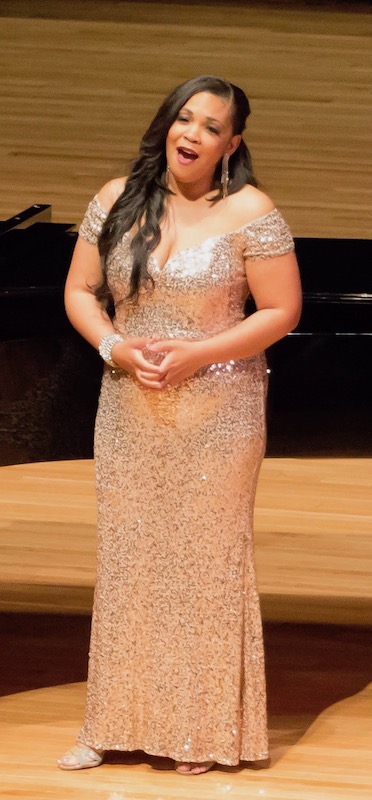Janai Brugger brings versatility, artistic depth to CAIC recital
The Collaborative Arts Institute of Chicago has done it again.
An organization dedicated to preserving and expanding the art song recital genre, the CAIC closed its season in grand style with a “Spring Lieder Lounge” event with Janai Brugger Wednesday night at DePaul University’s Gannon Concert Hall.
Brugger, a Chicago native, currently enjoys a flourishing international career, and was last seen locally as Ilia in Lyric Opera’s Idomeneo in October. Impressive as her Mozart singing was in that opera, the glamorous soprano—dazzling in a sparkly, form-fitting gown on Wednesday—seems even better suited to the more intimate scale of the vocal recital.
With a consummate keyboard collaborator in the veteran Martin Katz, Brugger offered a concise yet nicely varied program that showcased her interpretive depth and versatility, moving fluently through French, German, Russian and American song.
A set of Francis Poulenc chansons led off the evening. Brugger possesses a big gleaming soprano and, in the opening “Air Champêtre” one may have anticipated an operatic style that would overwhelm these light Gallic settings.
Not to worry. Brugger scaled down her ample voice with impressive skill. Throughout the program she showed keen expressive involvement and interpretive artistry, with close identification with the texts that was never literal or pedantic.
She conveyed the romantic impetuosity of Poulenc’s “Reine des mouettes,” and her top notes in “C” were radiant, with a hushed glow in the coda. For “Violon” she charmingly sat down next to Katz on the piano bench, offering an elegant, sensual rendition. The concluding “Fleurs” was the best of the set, rendered with shimmering tone in a lovely, sensitive performance.
Brugger also showed herself in synch with the chromatic melancholy of Rachmaninoff’s songs, sung in Russian. “To her” was aptly contemplative, moving seamlessly from musing introspection to an impassioned climax. Highlights included a fresh and spring-like “Daisies” and a searching, beautifully sung account of “A dream.” The prevailing Russian gloom was broken up with“Rat catcher,” Brugger bringing humor and a gallery of varied expressions to the whimsical setting.
The soprano was at her finest in her set of Richard Strauss lieder. Her luscious soprano brought expansive refulgence to “Heimliche Aufforderung” and “Cäcilie,” the latter culminating in a thrilling rush of romantic fervor.
Yet the finest singing of the set—and the evening— came with Strauss’s Ophelialieder, Op. 67.
In this mini-cycle of three songs set to Ophelia’s final speech from Hamlet, Brugger brought a degree of psychological penetration to her performance that was almost clinical. The soprano reflected Ophelia’s mental disintegration–from child-like fragility to agitation, sudden manic elation and deep confusion–with acutely detailed vocalism and terraced dynamic shading. Her dramatic acting out of Ophelia’s derangement was as powerful as her vocalism, the singer walking about the stage, gazing around in distracted fashion, and even bending under the lid of the piano as if seeking a safe harbor from her demons. A remarkable performance.
Two American composers were represented on Wednesday’s program. Brugger offered a timely tribute to Andre Previn, who died in February, with his Rachmaninoffian “Vocalise.” Joking “Hopefully, I won’t forget the words,” she rendered the sinuous, wordless melody in rapt, haunting fashion, with cellist Sonia Mantell adding a burnished string line to Katz’s piano.
The soprano closed with a choice selection of songs by Lee Hoiby. Avoiding the obligatory “The Serpent,” the five settings served to show Hoiby’s versatility and excellence in art song, as well as being a discerning chooser of texts.
Brugger put across the witty playfulness of “always it’s Spring” (text by E.E. Cummings), as surely as the enigmatic expression of “What if…” (Coleridge) and the lilting folksong of “To an isle in the water” (Yeats). “The Lamb” (Blake) was especially inspired, poised and beautifully sung with an affecting intimacy in the final repeated line, “Little Lamb, God bless thee.” She also conveyed the mercurial emotions and existential terror of “There came a Wind like a Bugle” (Dickinson).
Martin Katz’s piano playing was as expressive, subtly colored and eloquent as Brugger’s singing, not least in the postlude of Rachmaninoff’s “Daisies.”
The single encore proved apt since Brugger has recently been singing the role of Clara onstage in Porgy and Bess. She closed with a dreamy rendition of “Summertime,” with a violin obbligato assist provided by the singer’s husband, Javier Orman.
Opened last October, the 535-seat Mary Patricia Gannon Concert Hall is an imposing mid-size space with a soaring 30-foot ceiling and dark wood walls. At first hearing the piano sounded a bit loud and echoey Wednesday but the ear quickly adjusted. The space seems a grateful one for voices with striking clarity, presence and bloom.
CAIC’s 2019-20 season opens with the Collaborative Arts Festival September 5-8. This fall’s festival will feature art songs exclusively by living composers, performed by soprano Lauren Snouffer, countertenor Anthony Roth Costanzo and tenor Nicholas Phan. Also appearing next season are tenor Jonathan Johnson and mezzo-soprano Kelley O’Connor. caichicago.org
Posted in Uncategorized

